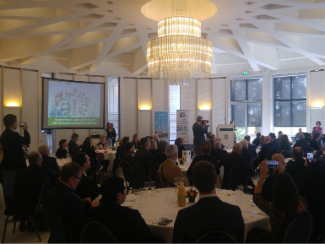- With the EPSA Awards, the European Institute of Public Administration (EIPA) recognizes the most innovative and successful initiatives in the European public sector
- Nowadays, the One Stop Shop System is operational in 97% of catalan villages and it includes 529 bureaucracy procedures related to economic activity

The ‘One Stop Shop’, a project of the Government of Catalonia, has been considered one of the four best practices in regional public administration by the European Public Sector Awards. The celebratory ceremony has been held today in Maastricht (Netherlands). With the EPSA Awards, the European Institute of Public Administration (EIPA) recognizes the most successful projects to improve the performance of public administration and strengthen its relationship with the society. Actually, this year the motto of the EPSA Awards is “An Innovative Public Sector in 2017 - New Solutions to Complex Challenges”.
The ‘One Stop Shop’ has shared category with three other projects: one about implanting a low emission zone in Antwerp (Belgium); one about young immigrant’s integration in Salzburg (from Austria, which finally has been the winner of the regional EPSA Award), and another one about a new way of organizing a government departament in Crete (Greece). The EPSA Awards have also two other categories: local authorities and states.
Josep Solà, general director of human and material resources of the Ministry of Business and Knowledge of the Government of Catalonia. Solà thinks that the EPSA recognition “proves the importance of working on projects like the ‘One Stop Shop’, because it improves the administration performance and, above all, contributes to energize our economy”. In addition, Solà emphasized that “the One Stop Shop facilitates the day-by-day to both entrepreneurs and enterprises, and it’s a guarantee of progress for our country”. Solà has been accompanied by Cristina Pruñonosa, general manager of the Business Management Office (the unit that has created and driven the ‘One Stop Shop’).
The vision of EPSA is to create an arena in which Europe's public sector institutions can excel and become an exemplar for the rest of the world. In this scheme, on July the One Stop Shop and 33 other projects were selected, among 145 candidates, as Best Practices.
FUE: 97% of catalan villages and 529 public procedures
The main objective of the One Stop Shop, a project by the Business Management Office (Ministry of Business and Knowledge – Government of Catalonia), is to reduce and integrate the bureaucratic procedures that all the citizens or companies have to fulfil in order to drive an economic activity in Catalonia
Nowadays, the One Stop Shop is operational in 97% of catalan villages (915) and its implantation is on progress in 13 more city councils (77% of the total population of the country). Only 19 city councils are pending, and one of them is Barcelona (the most important of the country, with 1,6 million of population and the biggest economy). Without Barcelona, only 125.000 citizens are now out of the One Stop Shop system.
The One Stop Shop includes 529 bureaucracy procedures related to economic activity, 40% of them with total online process. In addition to that, it should also be noted that the implementation of this system has contributed to investing the preferences of the companies regarding the electronic management of the procedures. While in 2014, 37% of the cases were administered electronically and 63% were in person, 2016 invested in the trend and the electronic management of the files represented 72% of the total.
The One Stop Shop is a project that has the participation and involvement of the different departments of the Generalitat, the Provincial Councils, the associations of city councils, each of the town councils that have collaborated, and especially the consortium Open Administration of Catalonia, which has facilitated technological solutions in the local world. It should be noted that the One Stop Shop participates in the European project Interreg PURE COSMOS, with other European partners in order to boost the competitiveness of SMEs.
